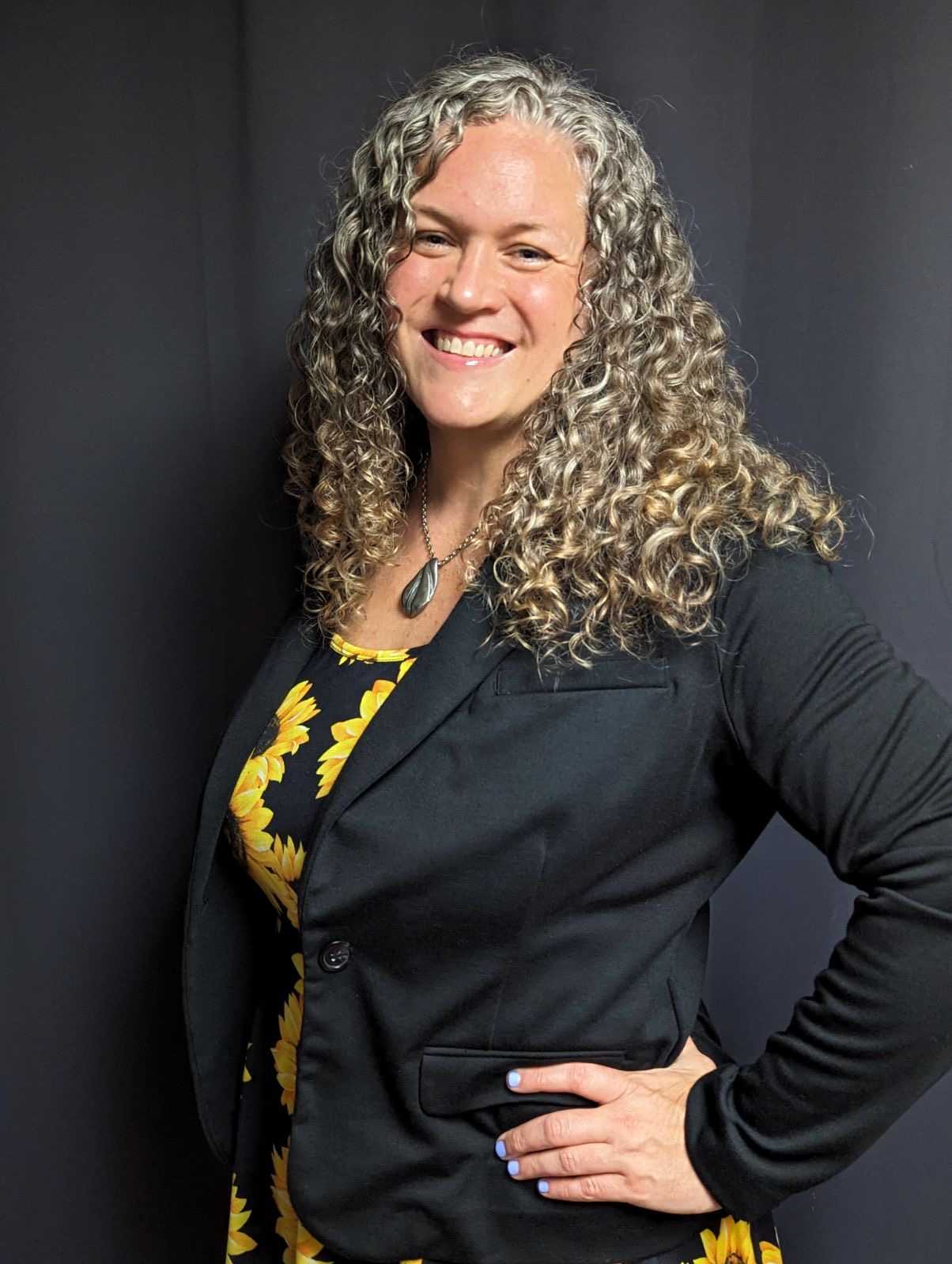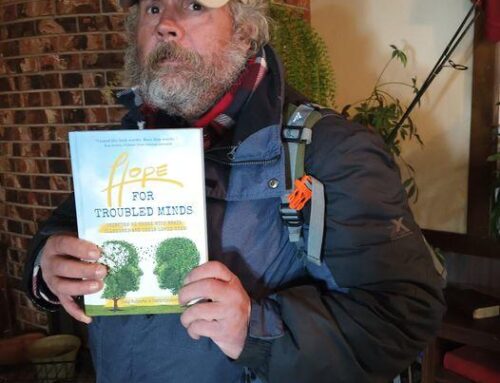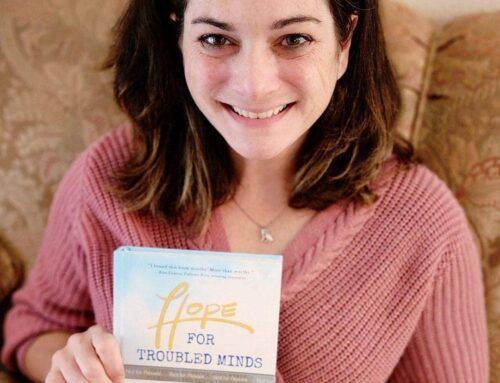Laura Riordan is a Business Development Manager for a successful, renowned IT staffing and consulting firm and lives in the Philadelphia suburbs with her significant other and biggest supporter, Chris, and their blended family of 5 kids – and a dog! Laura has faced the battles of bipolar since early childhood and was diagnosed in college after her first full blown mania. She loves being a mental health advocate and sharing her story with those suffering with mental health challenges to remind them that they are NOT alone. She has facilitated meetings and participated on the board of a local DBSA (Depression and Bipolar Support Alliance) peer led support group for 20 years. Laura’s blog is https://tamingthebipolarbeast.com and you can find more of her work athttps://oc87recoverydiaries. org/bipolar-support-groups/ and https:// betterbecausecollective.org/ stories/
After years of listening and learning from others in support groups, Laura developed an analogy for bipolar and depression based on the cliched “You can choose to see your glass half full or half empty.”
I asked Laura a few follow up interview questions after reading more about the analogy.
1. Accept that your brain is not functioning “normally” right now (whether it be due to inflammation, chemical imbalance, genetics, abuse/trauma, etc.) Know that there is hope for feeling fulfillment and purpose in life again! It may be in a different way than you had planned or it may take longer to get there, but every person in this world has value.
2. Find the professional care and support network that you need for your specific circumstances.
– Find a good therapist and determine with them if meds are an immediate need or if you’d like to tackle root cause analysis, grounding techniques and coping strategies, and specific therapy methods first (CBT, DBT, etc). If you are in a mental health crisis (suicidal thoughts and plan, mania or psychosis) then you need more critical care, with an evaluation at an ER with a crisis center and inpatient psychiatric unit, a mobile crisis offering, or an IOP (intensive outpatient) or PHP (partial hospitalization program). If you do need medication and/or supplements, work to find a doctor that will work with you and listens. Make sure they keep up to date on the research and require regular blood work and overall health and weight checks.
– For some of us emotional pain, trauma and anxiety can tie into pain and knots in our body. Working with an excellent massage therapist, musculoskeletal specialist, reiki master, acupuncturist, MFR therapist or NET therapist who understands the emotional tie-in to pain can be life changing. The best practitioners will also often teach you stretches and practices for self-treatment. My pain management therapists have helped me immensely with my chronic pain levels and emotional healing after traditional MRIs, PT, injections and pain meds offered no relief. Explore the professional care options that work for you!
– Find a support network!! Look for local support groups (DBSA, NAMI, Hearing Voices, etc) and online mental health support groups with a positive message. I’ve been attending a local DBSA group since 2003 and have actively participated in an online support group (Positive Depression and Bipolar Happy Place) for over 5 years. I worked with OC87 recovery diaries to publish an article on this exact topic. Link in bio. You are not alone!!
3. Educate yourself so that you can be self-aware of what is you vs. what actions, thoughts and symptoms may be common for your diagnosis and what treatments and strategies have worked for others. There are so many great resources out there (Kay Jamison, Julie A. Fast, Natasha Tracy, OC87, Gabe Howard, this blog from Tony Roberts, etc.)
4. Tackle your overall health and make self care a priority.
– Are you eating foods that will nurture your body and your brain? Are you getting sunshine and/or a Vitamin supplement? Are you taking fish oil for overall brain health? How are your B vitamins?
– Are you moving? Whether you can walk, run, do yoga, kickboxing, swim, Qigong, Tai Chi, water aerobics, or at least stretch and move your body in some fashion even while sitting down, it is so critical. I recommend moving a minimum of 20 minutes each day and that can be spread out in chunks. I suffer with chronic back and hip pain so I have to listen to my body each day to determine what I can do. I don’t think I’ll ever get back to rugby, but that was one of my favorite, hardcore workouts ever!! If you’re not sure what to do, working with an experienced personal trainer can be extremely beneficial. A friend who I met studying abroad in Spain now lives in the Philly area and he’s run outdoor bootcamps and now runs his own studio with fun and creative workouts and a holistic approach to health and growth for the body, mind and soul. He even offers virtual workouts if you’re interested!
– Do you spend time in nature reconnecting with the wonder of what’s all around us? My woods time, hikes, trees, creeks, and waterfalls are all part of my “church.” What brings you awe at the world around you?
– Are you harboring guilt, resentment or regrets? Let it go! Forgive yourself and others. If you feel that you can’t forgive someone, remember it doesn’t have to be an external process. It can just be for yourself and no one else has to know. Refusing to forgive is like drinking poison and expecting the other person to die. It will eat you alive inside.
– If you have regrets or things you want to work through, strategize with your therapist. It might be worth approaching friends or family or past contacts to resolve issues, apologize or request an apology.
5. Evaluate your current relationships with a significant other, family, friends, work, church, professional networking, volunteer work, etc. Have you set boundaries to make sure you have time for your own needs and self care? Are your relationships fulfilling? Do they allow you to love others and be loved every day?
6. Sleep hygiene!! There’s a lot of information out there around this but quality sleep is absolutely critical for the holistic health of our minds and bodies. Some helpful tips are melatonin, magnesium oil or baths, guided relaxation meditations, lights off at a specific time each night, white noise, and put away your phone and turn off the TV. The brain needs sleep to process out the garbage of our busy days and to retain the important and special memories. It’s science!
7. Practice meditation and mindfulness. And it does take practice!! Find what works for you. Guided meditation was the best for me for a long time but I’ve been getting better with focusing on one word or a mantra and quieting my mind. Mindfulness and living in the moment is a lifelong practice to be fully present all the time. Practicing gratitude and savoring the present moment can be helpful.
8. Find YOU again and your purpose. I put this as the last step, because we often have to do a lot of work to get to a place where we feel like we know ourselves again and can think of our interests, what makes us feel purposeful and fulfilled and what brings us joy.
– What makes you feel connected to others, to your innermost self and possibly even to a higher power or larger purpose? What makes you laugh? How do you love others and allow yourself to be loved?
– During a long, pretty severe hypomania I started a company called Bucket List Assistant to help people remember, reawaken and define their goals, dreams and passions and set plans to fulfill them. It’s still a personal passion of mine, but unfortunately I wasn’t able to fully bring the company to fruition when the hypomania was followed by a severe depressive crash. But I love the volunteer work I’ve done around this topic!
– Do you love music, art, languages, philosophy, writing? Are there places you’ve always wanted to see or things you’ve wanted to experience? Each day devote time to things that bring you joy and planning for the bigger goals and dreams.
These 8 steps have brought me from a life where I was riding a roller coaster, barely holding on, filled with regret, doubt, fear, literal insanity, 8 manic hospitalizations, and countless depressions and hypomanias, to a life with my love with our happy chaos large modern Brady Bunch family and a dog, a home, a fulfilling job with the ability to work from home, support of friends and family and my support groups and a professional care team that I trust. I’m not cured. I still have to be very wary of symptoms and triggers and closely monitor my sleep. I have days that my anxiety and self doubt is higher or that my thoughts and speech are a little fast paced. But I’m at a level that all symptoms are manageable and I can be high functioning. I’m no longer on the severe roller coaster of hospitalizations for not sleeping for weeks on end and for being “too happy” or dealing with a bombardment of suicidal thoughts. Everything isn’t perfect but we’re on a path toward our goals and dreams for our family.
Discover more from Delight in Disorder
Subscribe to get the latest posts sent to your email.






